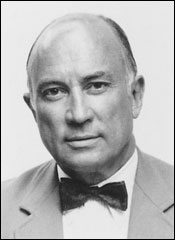Claude-Jean Bertrand, Creator of the Media Accountability System (M*A*S*) Concept, Dies
Institute to Oversee His Web-based Compilation of Media Ethics Resources
Columbia, Mo. (Oct. 3, 2007) — Officials at the Missouri School of Journalism and the Donald W. Reynolds Journalism Institute are saddened to learn of the recent death of Claude-Jean Bertrand. An expert in the fields of global journalism and media ethics, he created the Independent Press Councils website to improve media by providing a recognized set of ethical rules respected by journalists around the world.

According to Bertrand’s Web site, these rules and practices can be classified as Media Accountability Systems, or M*A*S*, which include “any non-governmental means of inducing media and journalists to respect the ethical rules set by the profession.” Examples are codes of conduct, press councils, ombudsmen, organizations, research and audits.
Bertrand taught at the university level in the United States, France, Spain and Africa and was a professor emeritus at the Institut francais de press (Universite de Paris-2). Since the mid-’90s, Betrand had participated in the Council of Europe, the European Journalism Centre, the European Institute for the Media, the International Press Institute, the United Nations Development Programme and other media ethics conferences on five continents. Bertrand authored, co-authored and edited numerous books on media ethics and the media that have been published in numerous languages.
Bertrand transferred his Web site to the Reynolds Journalism Institute in 2006 to ensure its permanence and make it more easily accessible worldwide. It contains the largest collection of press codes of conduct, numbering more than 400, in the world. There are close to 500 titles of books and 250 Web links related to media ethics, a directory of world press councils and a large number of documents concerning M*A*S*.
“We will always be grateful to Claude-Jean for this rich resource for journalism and scholarship,” said Dean Mills, dean of the Missouri School of Journalism.
The materials on the site come from a variety of sources both within and outside the profession. Information from the journalism field includes M*A*S* documents containing codes of press conduct, ombudsmen feedback, academic research, media-oriented non-government organizations and ethical audits. Non-journalism sources include journalism reviews and input from the cooperation of the media and the public through press councils.
Contributions about conferences, books about media ethics or M*A*S*, scandals, trials and other demonstrations involving media ethics and related topics are welcome.
The Reynolds Journalism Institute engages media professionals, scholars and other citizens in programs aimed at improving the practice and understanding of journalism in democratic societies. The Institute was funded by a $31 million gift from the Donald W. Reynolds Foundation.
The Donald W. Reynolds Foundation is a national philanthropic organization founded in 1954 by the late media entrepreneur for whom it is named. Headquartered in Las Vegas, it is one of the largest private foundations in the United States.
Updated: April 21, 2020